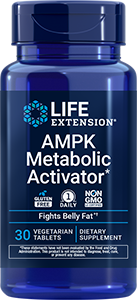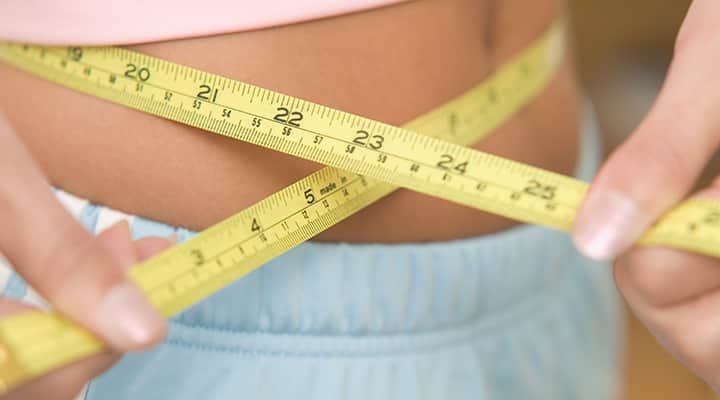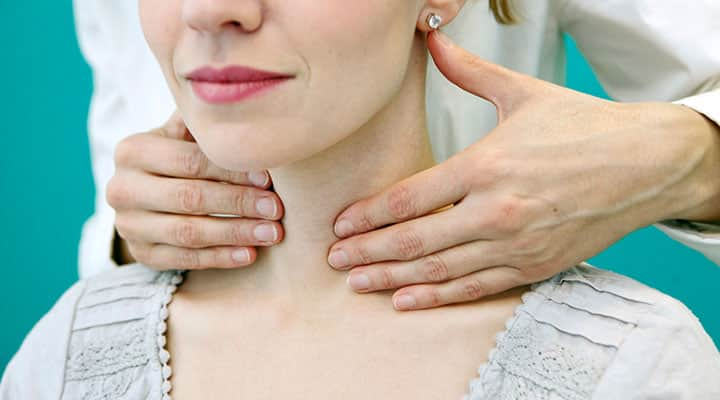
Diet vs. Exercise for Weight Loss: What’s the Difference?
Published: September 2021
If you want to achieve and maintain a healthy weight, you need healthy habits—and that includes a nutritious diet and exercise.
What if you don’t like working out? It’s true that you can lose weight through diet alone—but, we don’t recommend it. That’s because by cutting calories without adding exercise, you could be impacting your muscle mass and bone density. Plus, without the calorie burn of exercise, you might end up on an overly restrictive diet plan.
Instead, you want a strategy that not only helps you shed unwanted fat, but will also maintain your muscle mass and strength—and doing this requires eating nourishing foods and regular movement. Complicating the matter: exercise can make you hungrier, and that can get in the way of your progress.
So how can you achieve that delicate balance between dieting and exercise? Follow this guide—we’re happy to show you how.
Is the “80% diet, 20% exercise” rule true?

There are a lot of popular sayings when it comes to weight loss, like “weight is lost in the kitchen, not in the gym,” and “you can’t out-exercise a bad diet.” Another gem is: “follow the 80/20 rule to lose weight.” There’s actually some truth to all of these sayings.
While the numbers certainly aren’t exact, indeed, you may find that the majority of your weight loss success (for example, 80%) can be traced back to what you eat, while exercise will play a small role in whether that number on the scale budges (i.e., 20%...although these numbers are, of course, an estimate!).
That does not make exercise unimportant when it comes to a long-term weight management plan, however.
What is the relationship between diet, exercise and weight loss?
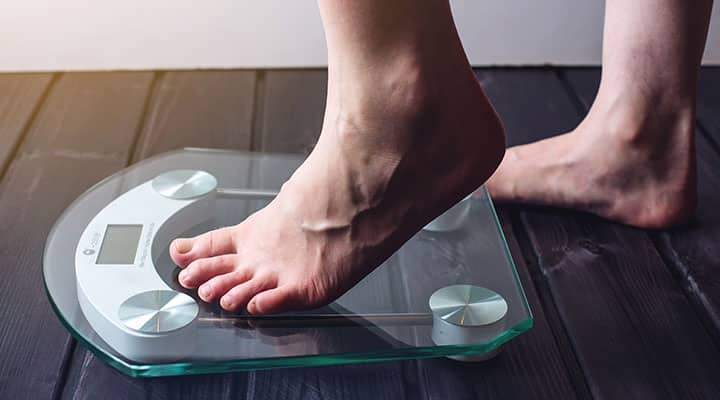
To maintain a healthy weight, you need to eat the kinds of foods that keep you fueled throughout the day, providing you with the nutrients you need to feel your best. On the other hand, exercise helps burn excess fat that your body has stored—and it boosts not only your calorie burn, but your resting metabolic rate. And you can’t exercise without proper nutrition—“running on empty” is not a good idea for anyone!
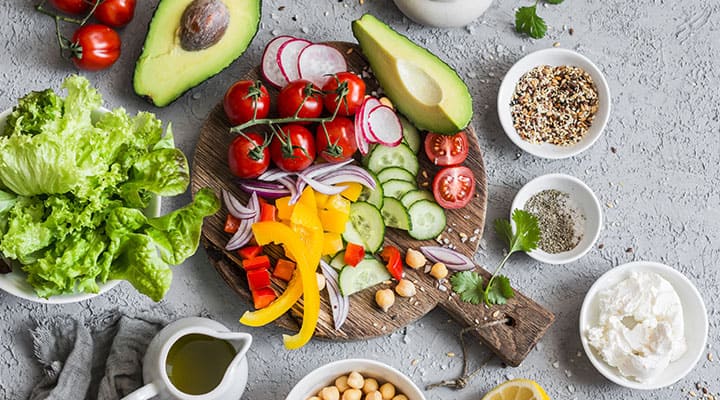
So what should you eat to get that number on the scale where you want it to be—while fueling those calorie-burning workouts?
Which diet is the most effective for weight loss?

Over the years, there has been an endless supply of fad diets that usually don’t work at keeping weight off long-term. What does work is following a well-rounded, time-tested plan like the Mediterranean Diet, which is packed with veggies, fruits, seeds, whole grains, lean protein and healthy fats and will help you to shed some lbs…and keep them off, long-term.
More of a philosophy about eating that also emphasizes heart health more than your typical weight loss plan, the Mediterranean Diet differs from other diets that banish entire food groups or focus on counting calories or macros. Here’s a brief primer.
Explore Our Best Weight Management Supplements
Mediterranean Diet 101
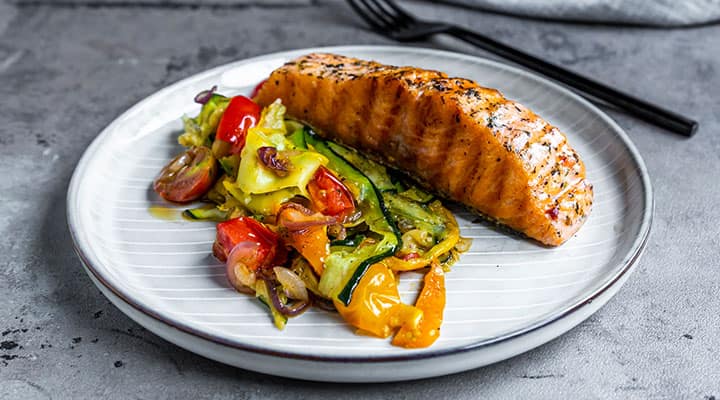
Eat lots of:
- Healthy fats—The signature item of the Mediterranean diet is a heart-healthy fat found in the Mediterranean region: extra virgin olive oil. EVOO will become your new BFF when it comes to sautéing, marinating and even creating a healthy salad dressing. Avocado and nuts are also great additions to your plate.
- Fruits and veggies—Make the produce section your go-to when you grocery shop. Tomatoes, broccoli, kale, spinach, cauliflower, bananas, grapes, melons, peaches and other fruits and veggies are all great, healthy picks for your plate.
- Nuts—Almonds, cashews, pumpkin seeds, walnuts, and most other nuts make a great snack or addition to any salad; they are heart-healthy and rich in nutrients.
- Beans—Legumes are especially beneficial because they are packed with fiber and protein, which keep you full longer. Make sure your diet includes black beans, white kidney beans, lentils, chickpeas and kidney beans.
- Healthy starches—Many people think they have to cut out carbohydrates to maintain a healthy weight. But nutrient-rich whole grains like oats, brown rice, barley, whole-grain bread, and yes, even pasta, provide energy and keep you full…all while pleasing your palate (which, by the way, matters!). Potatoes, sweet potatoes, turnips and yams are also great options.
- Lean protein—For optimal weight management success, you’ll want each meal to include a good source of lean protein, such as fish, poultry, eggs, or Greek yogurt.
- Water—Drinking eight 8 oz. glasses of water throughout the day is a good place to start—you might need even more! While not technically an appetite suppressant, it can keep the food cravings at bay, since many people tend to mistake thirst for hunger. It also helps flush toxins and cleans your internal systems.
- Other beverages—Coffee and tea are also part of the Mediterranean Diet; both have natural properties that help promote healthy weight management.
Eat less:
- High-fat animal protein—Too much red meat isn’t a good thing when it comes to your overall health, so skip the steaks and burgers (or eat them less frequently). It’s also time to say buh-bye to butter.
- Processed oils—Refined oils are extracted using heat and lose most of their natural nutrients by the end of the extraction process, so be cautious about how much canola, vegetable, soybean, safflower and corn oil you consume.
- Sweets—Sugar is a sneaky saboteur when it comes to weight management. It’s filled with empty calories that keep you craving more. Steer clear of sodas, candy, and ice cream. Also be on the lookout for hidden sugars in yogurt, granola bars, and even pasta sauces and most salad dressings. Make sure to read the labels on any food items before committing them to your shopping cart. (And if you are having a hankering for something sweet, instead opt for fresh fruit or a handful of your favorite nuts.)
How to incorporate regular exercise

While what you eat for breakfast, lunch and dinner ultimately will have the biggest impact on your weight, you should make sure you are getting at least 30 minutes of exercise daily to get your heart pumping, while slimming and trimming your waistline. Physical activity helps increase the number of calories that your body uses for energy, rather than storing it as fat.
Exercise doesn’t have to be mundane or boring, so make sure that it is something that you enjoy yet makes you sweat. Here are our top recommendations for workouts that support your weight loss goals.
- Walk—Walking is the easiest way to get active, especially if you haven’t been active in a while. It requires no equipment, plus, it is also low impact–meaning anyone, at any age or fitness level, can hit a walking trail.
- Run—Want to put a little more pep in your step? Take your walk to the next level and make it a run. Running or jogging provides aerobic exercise that can help burn excess body fat.
- Hit the gym—With the right routine, you can shed some serious pounds and build muscle in the process. Even better news: compared to other forms of exercise, a strength training workout will continue to burn calories long after you’ve ended your sweat session by increasing your metabolic rate.
If these options don’t appeal to you, try yoga, dancing, biking…really, any type of movement will benefit your overall health and support your weight management goals.
How much weight can you lose from exercise?

Wondering how much weight you can expect to lose from working out? The answer is not quite that simple and depends on many factors, like your starting weight, age, gender, sleep, medical conditions, and even genetics. Weight management is not a sprint, but a marathon (no, you don’t have to run one, but you can if you like).
That being said, with an exercise regimen in place, assuming you’re not also increasing your calorie intake, you can expect to lose approximately 1-2 pounds per week, keeping in mind that a one-pound weight loss equates to a 3,500 calorie deficit. That may be easier said than done, though—sometimes, working out can make us hungrier (because it can increase your appetite, and also, psychologically, you might feel like you “earned” that muffin because you pushed it so hard at the gym, and might end up eating many more calories than you would have if you’d stayed on the couch!).
What else besides exercise and diet can help me lose weight?

Exercise and diet are the building blocks for achieving your weight loss goal. But if you’ve been on and off the diet rollercoaster before and still need some extra support, certain nutrients may help you (finally) get to your goal.
Here are our top picks:
- White kidney bean extract—This little bean with big benefits when it comes to your weight management goals. White kidney bean extract may help slow the digestion of the carbs from your food.
- Saffron—This pretty plant is an excellent option for caffeine-free appetite management support. Saffron can help you maintain a healthy weight by modulating the levels of those neurotransmitters driving you to snack.
- Belly burner—In addition, while it’s not linked to weight loss per se, a nutrient that jumpstarts your AMPK levels naturally can help you burn abdominal fat for energy—making it a great way to support those better body goals!
References
- Gupta Subash C et al. "Therapeutic Roles of Curcumin: Lessons Learned from Clinical Trials."AAPS J., January 2013, https://www.ncbi.nlm.nih.gov/pmc/articles/PMC3535097/
- Petre A, MS, RD (NL). "10 Benefits of Golden (Turmeric) Milk and How to Make It." Healthline, September 2018, https://www.healthline.com/nutrition/golden-milk-turmeric

